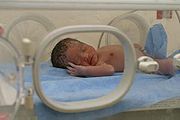
Parents whose babies are born with congenital heart defects face a high risk of developing PTSD, symptoms of trauma and other mental health issues, researchers said recently.
Reviewing data from 10 countries, the researchers also found that 25 percent to 50 percent of the parents reported elevated symptoms of depression and/or anxiety and 30 percent to 80 percent reported severe psychological distress.
The PTSD rate among these parents is approximately 10 times higher than the rate for the general population in the United States. Only about 18 percent of the population suffers from an anxiety disorder, and 9.5 percent meets the criteria for any mood disorder.
The researchers also found that mothers of children with the heart defects are more affected than fathers.
“We’re not 100 percent clear about why,” Sarah Woolf-King, senior study author and an assistant professor in the Psychology Department at Syracuse University, said.
“But we think it has to do with, one, the first surgery typically occurs in the postpartum period when mothers are already at increased risk for mental health issues and, two, the care of the sick child can disproportionately fall on the mother."
In conclusion, the research team recommended more recognition of these parents, who must cope with their child’s doctor’s appointments, cardiac procedures, hospital stays, digestive and feeding issues, and higher risk of major respiratory illness. There’s also the extreme emotional, familial and financial cost.
“There is a real need for additional research on the severity, course and persistence of mental health problems over time,” Woolf-King said.
Untreated, the mental issues can affect parents and their caregiving abilities for months or years after the child’s birth.
“The parents need extra support and mental health treatment that is feasible and accessible,” Woolf-King said. “One thing that we propose is integrating mental health screening and treatment into pediatric cardiology care. Healthcare providers on the front line of treatment for these parents could play a significant role in connecting them to care.”